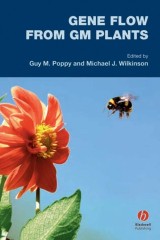Details

Gene Flow from GM Plants
Biological Sciences Series 1. Aufl.
|
212,99 € |
|
| Verlag: | Wiley-Blackwell |
| Format: | |
| Veröffentl.: | 15.04.2008 |
| ISBN/EAN: | 9780470994108 |
| Sprache: | englisch |
| Anzahl Seiten: | 256 |
DRM-geschütztes eBook, Sie benötigen z.B. Adobe Digital Editions und eine Adobe ID zum Lesen.
Beschreibungen
Gene flow is not unique to genetically modified (GM) crops, but the possibility of the spread of transgenic DNA to wild and domesticated relatives raises a new set of issues for scientists and policymakers to consider. Unfortunately, we are still too often unable to quantify the risks of ecological damage associated with gene flow. This is due partly to the huge breadth of knowledge required to assemble a comprehensive risk assessment. For example, many scientists active in research on the mechanics of gene flow nevertheless lack a deep understanding of what is required to identify, characterise and assess ecological risk, and many of those who are aware of the risk assessment process and the framework used for legislation have insufficient knowledge of the reproductive biology, agricultural systems, modelling and ecological literature required to compile a balanced risk assessment. <p>This book, set in the context of gene flow in general, considers the assessment, measurement and management of the risks of gene flow from GM plants, combining the expertise of all the various stakeholders. It is directed at researchers and professionals in plant molecular genetics and plant ecology, in both the academic and industrial sectors.</p>
List of Contributors. <p>Preface.</p> <p>1. Where Science fits into the GM debate (Philip J. Dale).</p> <p>2. Crop biotechnology - the state of play (Thomas AE. Nickson).</p> <p>3. Pollen dispersal vector5ed by wind or insects (Gavin Ramsay).</p> <p>4. Hybridisation - reproductive barriers to gene flow (A. J. Richards).</p> <p>5. Rare hybrids and methods for their detection (Rikke Bagger Jorgensen and Michael J. Wilkinson).</p> <p>6. Assessing the ecological fitness of recipients (Arthur E. Weis).</p> <p>7. Assessing the environmental risks of gene flow from GM crops to wild relatives (Alan Raybould and Michael J. Wilkinson).</p> <p>8. Quantifying exposure (Jamie P. Sutherland and Guy M. Poppy).</p> <p>9. Regulating the risks of gene flow.</p> <p>10. Risk assessment of GM crops - does the road ahead need to be long and winding (Guy M. Poppy and Michael J. Wilkinson).</p> <p>Index.</p>
“This comprehensive title provides readers with an in-depth look at how genetically modified plants can affect wild populations. It features contributions by leading experts in the field. This covers a broad range of subjects, including how gene flow occurs, how to evaluate the potential risks, and the need for regulations.” <i>Bella Online</i><!--end-->
Dr Guy Poppy, School of Biological Sciences, University of Southampton, UK <br /> <p><br /> </p> <p>Dr Michael Wilkinson, Department of Agricultural Botany, School of Plant Sciences, University of Reading, UK</p>
Gene flow is not unique to genetically modified (GM) crops, but the possibility of the spread of transgenic DNA to wild and domesticated relatives raises a new set of issues for scientists and policymakers to consider. Unfortunately, we are still too often unable to quantify the risks of ecological damage associated with gene flow. This is due partly to the huge breadth of knowledge required to assemble a comprehensive risk assessment. For example, many scientists active in research on the mechanics of gene flow nevertheless lack a deep understanding of what is required to identify, characterise and assess ecological risk, and many of those who are aware of the risk assessment process and the framework used for legislation have insufficient knowledge of the reproductive biology, agricultural systems, modelling and ecological literature required to compile a balanced risk assessment. <br /> <p><br /> </p> <p>This book, set in the context of gene flow in general, considers the assessment, measurement and management of the risks of gene flow from GM plants, combining the expertise of all the various stakeholders. It is directed at researchers and professionals in plant molecular genetics and plant ecology, in both the academic and industrial sectors.</p>

















